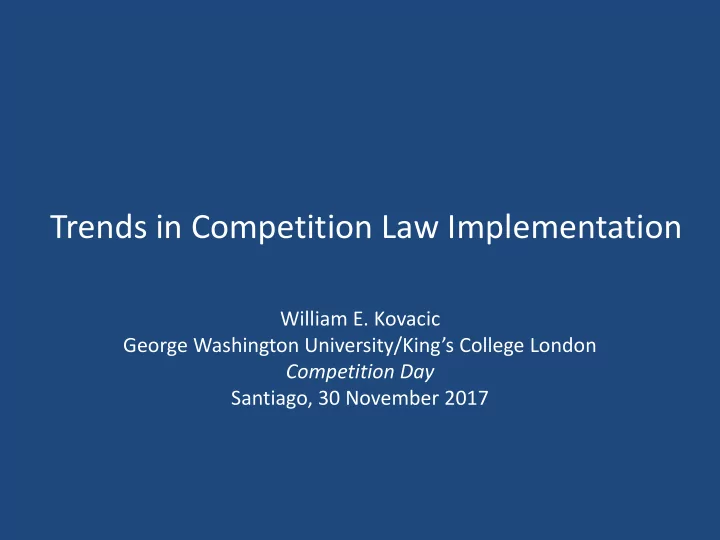

Trends in Competition Law Implementation William E. Kovacic George Washington University/King’s College London Competition Day Santiago, 30 November 2017
The Remarkable Transformation • Competition Law Systems – 1950: <10 – 1987: <30 – Today: >130
The Rediscovery • Importance of Policy Implementation • Focus on Institutional Design • Attention to Agency Operations • Extraordinary Possibilities for – Comparative study – Accelerated learning
Agenda • General Observations • Promising Trends • Personal Views only • Contact: wkovacic@law.gwu.edu
Resources • Kovacic & Lopez-Galdos, Lifecycles of Competition Systems: Explaining Variation in the Implementation of New Regimes, 79 Law & Contemporary Problems 85 (2016) • Kovacic & Hyman, Consume or Invest: What Do/Should Agency Leaders Maximize?, 91 Washington Law Review 295 (2016) • Kovacic, Project Selection (2016) (ICN On Demand Training Video), available at www.internationalcompetitionnetwork.org
Greater Awareness of Nature of Competition Law and Policy • Experimental Quality • Importance of Learning • Risk (and Failure) as Essential to Progress • The Virtuous Cycle: Incremental Improvement – Experimentation – Assessment – Adjustment
Realism in Expectations • The 20-30 Year Start-Up Phase – Determining durability of political support across regime changes – Assessing agency resilience • Leadership transitions – Setting necessary agency foundations – Establishing collateral institutions
Realism in Comprehending Difficulty of Program Implementations • Examples: – Routine Investigation Tasks – Merger Control – Conversation with the Courts – Leniency – Criminal Enforcement
Insights into Leadership Traits • Economic Awareness • Political Awareness • Management Experience • Resilience • Technical Proficiency
Better Understanding of Impact of Design Choices • Multiple Goal Structures – Public interest and political intervention • Multiple-Function Agencies • Governance Choices: Boards vs. Colleges
Promising Trends • Prioritisation and Project Selection • Governance • Process
Realistic Aims • Thoughtful Weighing of Risks and Rewards – By project – Across the portfolio – Calculated risks vs. reckless gambles • Matching Commitments to Capacity • Good Management Processes – Close attention to “criticality one” matters • Learning from Experience
Setting Priorities: General Considerations • Inevitable and Necessary • Most Important Leadership Task – “Happy to have the job” vs. “Here to do something with the job| • Fire Department Model – Reactive, activity-based measurement • Sailing Ship Navigation Model – Destination-oriented, adaptive
Why Prioritization Is Difficult • Identifying Best Return on Investment • Multiple (Inconsistent) Legislative Goals • Mismatch: Legislative Aims/Resources • Leadership Incentives: Consume or Invest? • Multi- Function Mandates: “Competition - Plus”
Agency’s Role • Emergency Room Triage – Hidden tradeoffs? • Policy Shock Absorber • Adaptation Mechanism
Prioritization and Legitimacy • External Consultation • Meaningful Disclosure – Exemplar: NZ Commerce Commission • Statement of Intent, Strategic Plan • Evaluation • Legislative Adjustment
Priority Setting: Desired Features • Knowledgeable Leadership Team – Experience, expertise, judgment • Meaningful Disclosure • Historical Awareness • Balance: Consumption and Investment • Evaluation
Suggested Project Selection Criteria • Consistent with Our Priorities? • Anticipated Gains? • Potential Risks? • Who Will Do It? • How Much Will It Cost? • How Long Will It Take • How Does It Fit in the Existing Portfolio? • How Will We Know If It Worked?
Good Process: Overlooked Elements • Quality of Human Capital • Meaningful Disclosue • Evaluation
Recommend
More recommend